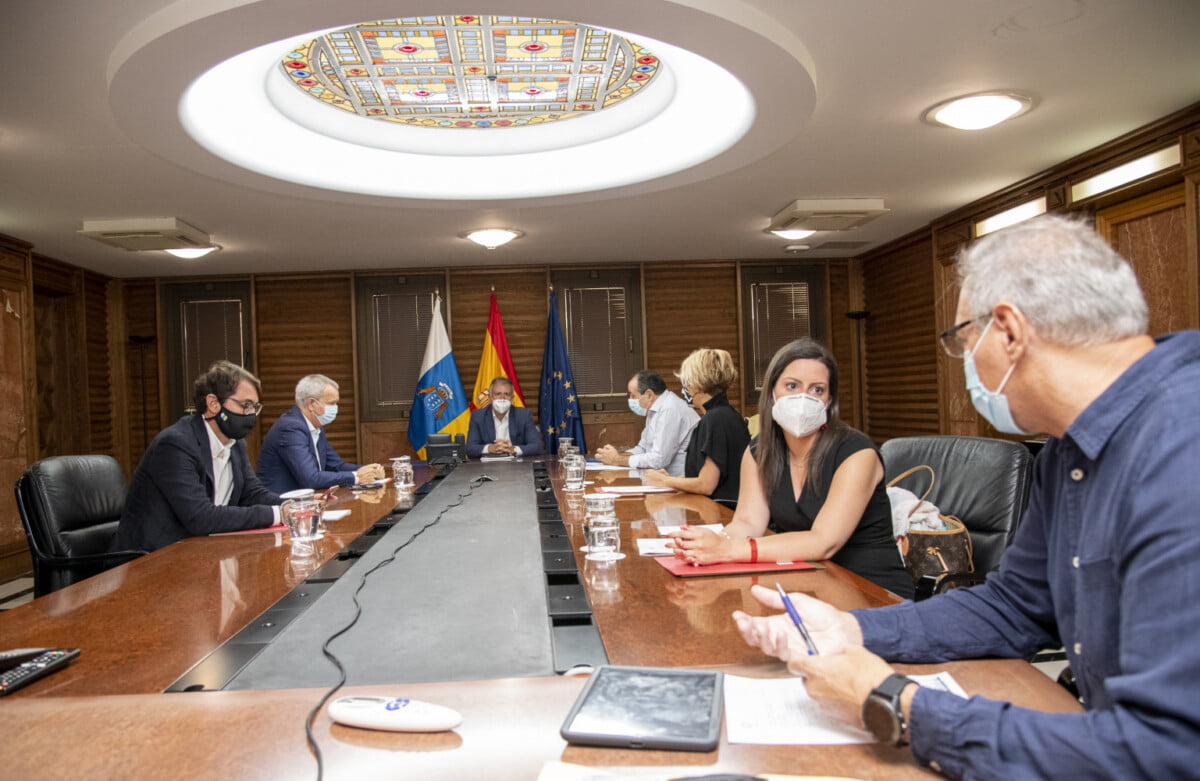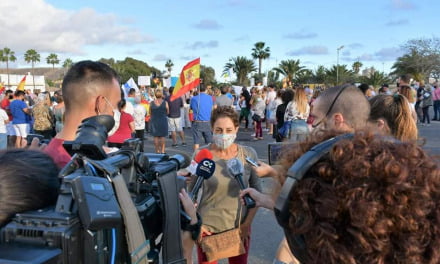The Canary Islands Extraordinary Governing Council meeting held Thursday morning (August 13, 2020) has agreed to approve a series of health measures seeking to contain the current outbreaks on the islands. At the request of the Spanish Ministry of Health, they approved mandatory use of masks, both in open outdoor spaces as well as closed indoor spaces, irregardless of whether the prescribed 1.5 meter safety distance can be maintained. The Council also brought in sweeping new restrictions for the restaurant, bar and nightlife sectors.
Having verified a significant increase in cases of COVID-19 throughout the Archipelago, especially among people under 30 years of age, several having been linked to nightlife, the Government once again finds itself having to take swift action in order to try and control the potential for community transmission. There are 28 active outbreaks across The Canary Islands, with 268 cases diagnosed in the last 14 days and 745 close contacts identified, who have also been placed in quarantine. Currently there are 638 active cases of Corona Virus COVID-19 in The Canary Islands, with more than 400 active on Gran Canaria.
Despite the sudden increase over the last week, the Canary Islands so far maintains its ranking in Spain as having the lowest number of detected infections throughout the pandemic, with a lower cumulative incidence of diagnosed cases over the last 14 days than elsewhere in the country, and a per population infection rate standing at just 22.71 cases for every 100,000 inhabitants, better than Asturias and Galicia, according to the latest official COVID-19 report (Wednesday, August 12) published by the Ministry of Health.
On July 31 there were 15 active outbreaks in the Canary Islands, involving 157 confirmed cases and more than 500 close contacts identified and placed in quarantine. In other words, in two weeks the number of people involved in outbreaks has increased by 50%.
Faced with this situation, the Governing Council has decided to adopt new restrictive measures proportional to the risk and directed at those areas or sectors in which the risk of transmission must be reduced.
Mandatory mask
As of this Friday, when the agreement is published in the BOC (State Gazette Bulletin), the mandatory use of masks will be established by for everyone aged six years and over. It will be mandatory to wear a mask on “public roads, in open air spaces and in any closed space for public use, or open to the public, irregardless of maintaining the interpersonal safety distance of at least 1.5 meters”.
The correct use of masks will be mandatory: it must cover the nose and mouth completely at all times. Likewise, it must be properly adjusted to the nose and chin, so as to prevent the expulsion of respiratory secretions to the environment.
Masks will be mandatory in all hotel and restaurant establishments and services, including bars and cafes. The obligation only excludes the time taken to eat food or drink.
On the beaches and at swimming pools, you are not obliged to wear a mask while bathing and while you occupy a particular or specified space, without moving (so not needed while sunbathing), and provided that interpersonal safety distances are respected and can be guaranteed between all beach or pool users. In any case, the use of a mask will be mandatory at the entrances, in corridors and on walkways throughout those spaces and facilities.
Non-university educational centres, can be excluded from the obligation to wear masks, when stable coexistence groups have been established between students, schoolchildren and in other school groups, when they are seated at their desks at a distance of at least 1.5 meters.
The obligation to use a mask will not be enforceable in cases provided for in article 6.2 of Royal Decree-Law 21/2020, of June 9, on urgent prevention, containment and coordination measures in the face of the ongoing COVID-19 health crisis.
In addition to this obligation, the Governing Council, at the request of Spain’s Ministry of Health, recommends the use of a masks in all private spaces, “both open and closed, when meetings between people, from different coexistence centres, are held”.
Hospitality Sector
Along with the existing measures relating to masks established for hospitality, leisure and catering businesses, no more than 10 people are to be allowed to sit at the same table or group of tables, whether inside and outside the premises.
Separation distances of at least 1.5 meters must be maintained between tables or groups of tables, as well as between individual clients or groups at the bar.
The maximum occupancy per table or group of tables indoors and outdoors will be limited to 10 people and the necessary separation distances must be adequately displayed.
Nightlife
Nightlife venues must close no later than 1.30 am. No new clients are allowed in after 1am
Nightlife is only allowed in open spaces and on open terraces. These can only be open to the public, exclusively for sitting or standing consumption, and always in previously reserved spaces with pre-booked tickets (ie no mingling between groups). Access will be through nominative tickets in pre-reserved set groups of up to 10 people from an individual’s social or family environment, sitting or standing, and food and drinks will be directly served to each reserved area.
In any case, the capacity for all outdoor terraces, discos and nightspots can only be up to a maximum of 70%. In addition, it is necessary to maintain interpersonal distances, and the use of masks remains mandatory.
When there is a space on the premises for a dance floor or similar, this may be used to install tables or reserved spaces, on the basis of not being able to dedicate said space to its habitual use.
Clubs and other nightlife establishments must have frequent natural ventilation or, if air conditioning is used, sufficient air renewal, capturing outside air from a suitable place
Where appropriate, security personnel will ensure that interpersonal safety distances are respected, and will seek to avoid the formation of large groups and gatherings, paying special attention to the access points and areas immediately surrounding, as well as any other area where safe interpersonal distances are not being respected.
The Government will hereby prohibit gatherings and parties on recreational boats, where a safe distance cannot be maintained.
The president also stressed that the celebration of festivals and popular festivals will continue to not be authorised, given the current epidemiological evolution of the situation.
The Governing Council also approved the prohibition of smoking on all public roads, or in any spaces for public use, where a physical distance of 1.5 meters cannot be maintained.
Finally, the president announced special attention for nursing homes, which implies there will be screening of both residents and workers.
Source: Canary Islands Government











Stopping smoking in the public highway! Let’s keep this forever so I don’t have to smell that fowl disgusting stench of cannabis every time time someone gets turfed out of one of the Cana-cafes and shares that horrible habit with people who do not choose to participate! Great idea that was by the way… opening up that hobby to every man and his dog and his tramp! ?
do I need a mask while ride a bicycle?
Thanks for sharing. I am travelling next Sunday and I hope my flight wont be cancelled. Surely wearing masks in outdoor pools and the beach is not convenient at all.
😀 neither is severe respiratory complications, sticky blood and collapsed kidneys…
Chances of that are less than minuscule when on a beach. Life is full of risks. Why don’t we ban all cars, they kill and injure more people than covid. Masks in enclosed spaces, yes, but this is getting ridiculous. Ruin everyone’s holidays by forcing them to wear a hot sweaty mask in the sun, and deter many others from coming, it’s not strategically clever. You’ll be having to wear them at home soon and while sleeping if they keep going like this. Remember most people touch them, handle them incorrectly, and don’t wash them – they harbour germs. Also the virus can enter via your eyes so they don’t protect. They are not the golden ticket answer so many people think they are. Walking down a mountain path miles from anywhere having to wear a mask is just patently stupid. Let’s bring back a bit of common sense, please.